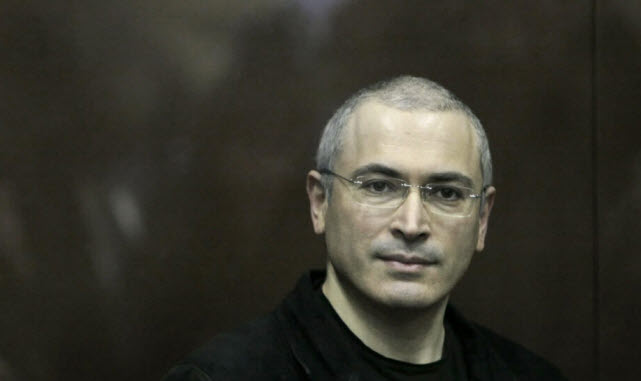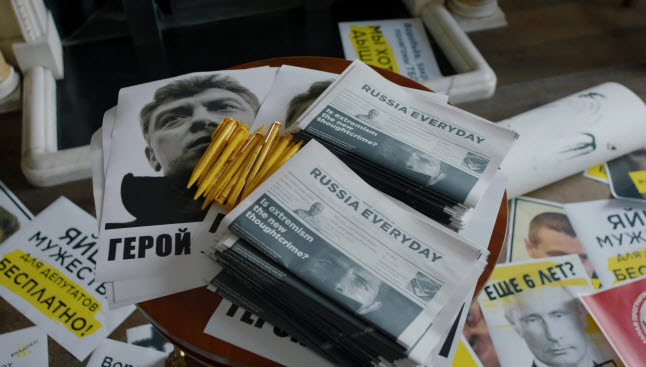Alex Gibney’s documentary “Citizen K”, which is available on Amazon Prime, presents the rise and fall of Mikhail Khodorkovsky, who was once one of the most prominent Russian oligarchs in the early 2000s. While never overlooking a number of questionable things in Khodorkovsky’s life, the documentary enlightens us a lot on how his country fell into another authoritarian regime not after the fall of the Soviet Union in 1991, and that is alternatively chilling and compelling to say the least.
Via a number of various interviewees including Khodorkovsky himself, the documentary initially gives us a brief overview on how bad things were in Russia during the 1990s. When the country attempted its own capitalistic experiment, everyone in Russia was hopeful about possible changes to follow, but, alas, the result turned out to be disastrous, and Boris Yeltsin, who was the president of Russia during that time, soon faced the big possibility of losing the upcoming election in 1996.
Seeing that their country might go back to good old communism due to Yeltsin’s rapidly decreasing popularity, a group of Russian oligarchs including Khodorkovsky were quite concerned for good reasons. They had earned lots of money and power thanks to their close connections with Yeltsin’s government, and they certainly wished that Yeltsin would remain to be the president at least for a few more years.
And they did have the power to boost the support for Yeltsin considerably. Mainly via the mass media under their control, they tried really hard in presenting Yeltsin in a lot more positive ways, and, what do you know, their media strategy worked much better than expected. Yeltsin eventually succeeded in getting re-elected, and he certainly rewarded the Russian oligarchs for that. As a result, these rich dudes came to have much more power and wealth than before, and they were naturally willing to support whoever would succeed Yeltsin, as long as that guy would maintain the status quo for them.
When Vladimir Putin quickly and suddenly rose as Yeltsin’s successor during next several years, Khodorkovsky and his fellow Russian oligarchs had no problem with supporting Putin from the beginning. Once he became the new President of Russia in 2000, Putin seemed to be ready to work along with them for their mutual benefit, and it looked like they would be left alone without any interference if they just did not meddle with his political business in exchange.
However, Putin gradually began to show his true color during next several years. As a former KGB officer, he was quite adamant about having everything under his absolute total control, and Khodorkovsky soon came to clash with Putin a lot as he gradually became one of the most vocal critics of Putin and his government. He was well aware of what Putin and his government might do for silencing him once for all, but he often went all the way for criticizing Putin and his government, and Putin eventually decided to crush Khodorkovsky by any means necessary.
What followed next is an utterly absurd tale of political prosecution. Khodorkovsky was accused of ordering the murder of the mayor of one small Siberian city who happened to be in a serious conflict with him, and then his company was indicted for failing to pay the taxes to the government. In case of the former case, there are some dubious aspects associated with Khodorkovsky, and Khodorkovsky is also rather vague about the case in his interview. In case of the latter case, it is clear that Putin wanted to show who is the boss to Khodorkovsky and other Russian oligarchs, and there was nothing Khodorkovsky could do except showing some defiance before eventually sentenced to the 10-year imprisonment in Russia.
During that imprisonment period, Khodorkovsky came to find more will and resilience, so he did not step back at all when he was charged for another thing around the time he might be paroled. This time, he came to get much more support in public as Putin’s public image became less positive than before, and he responded to the following trial with cynical sarcasm before sent back to the prison with more imprisonment time as expected.
Anyway, Khodorkovsky was eventually released several years later mainly because Putin wanted to improve his public image inside and outside Russia more for the upcoming 2014 Sochi Winter Olympics. After immediately leaving Russia, he eventually settled in London along with his family, and he became one of the most well-known anti-Putin Russian figures as being quite active about exposing the dirty and unpleasant sides of Putin and his government, though both he and the documentary recognize how limited he and his fellow activists are in many aspects. Having the total control on many things besides the mass media, Putin and his new Russian oligarchs are ready to do anything for continuing their authoritarian reign, and, as all of us know, they are still reigning in Russia despite their big current problem with Ukraine.
Overall, “Citizen K” is worthwhile to watch for getting more insights on what has been going on in Russia during last three decades, and Gibney and his crew members including editor Michael J. Palmer did a splendid job of presenting their main subject with enough interest and fascination. In short, this is one of the better documentaries in Gibney’s stellar filmography, and I am glad that I belatedly checked it out today.










